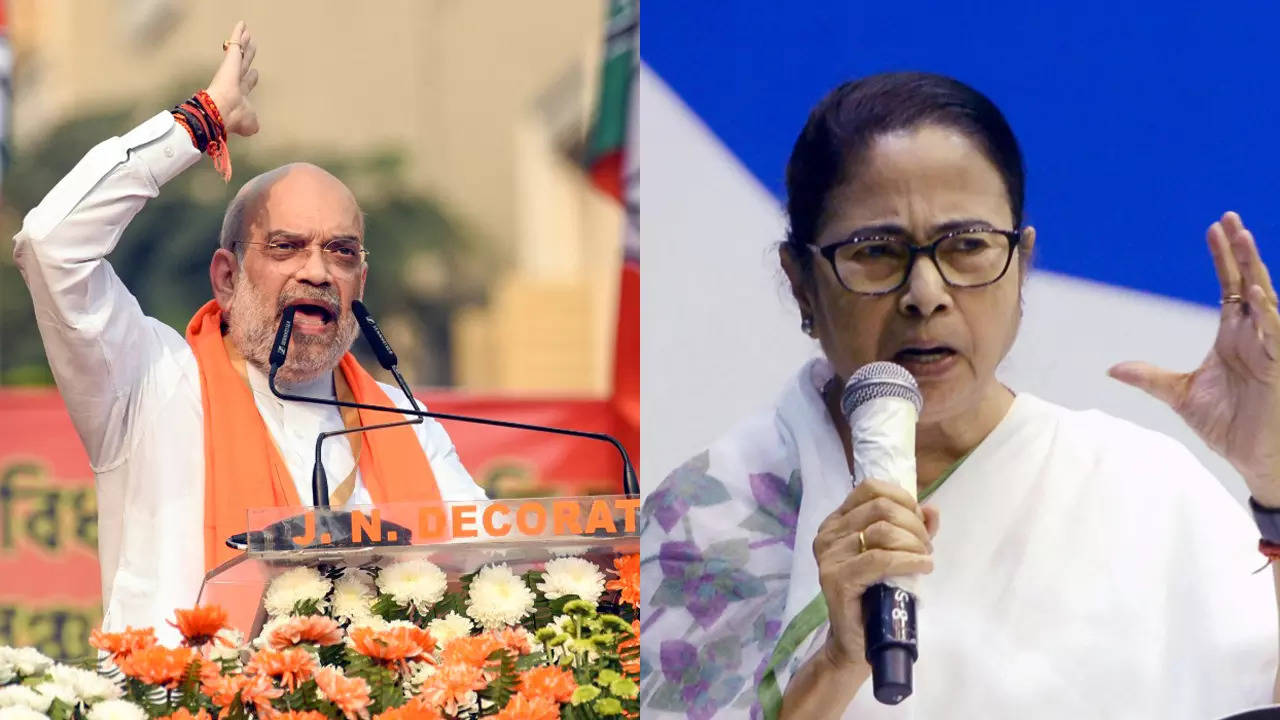[ad_1]
NEW DELHI: Union home minister Amit Shah on Wednesday once again asserted that the Citizenship (Amendment) Act (CAA) is a law of the country and no one can stop its implementation. He accused West Bengal chief minister Mamata Banerjee of opposing CAA due to vote-bank politics.
“Mamata Banerjee has not been able to stop infiltration in Bengal. Voter cards and Aadhar cards are being distributed openly to infiltrators in the state and Mamata Banerjee is sitting silent.She has been opposing the CAA due to her support to infiltration,” Amit Shah said at a rally in Kolkata.
“Assam has done a commendable job in stopping infiltration. But in West Bengal, infiltration persists due to the TMC government’s vote-bank politics. Mamata Banerjee is opposing CAA, but let me say it clearly that CAA will be implemented in the country. No one can stop the implementation of CAA,” Shah declared.
Amit Shah accused Mamata Banerjee of destroying the state and unleashed a blistering attack on the Trinamool government over the issues of appeasement, corruption and political violence.
The CAA was passed in December 2019 but is yet to be implemented as the rules that govern the law have not been notified by the Union home ministry amid very strong opposition from some parties. The CAA seeks to grant citizenship to members of Hindu, Sikh, Parsi, Christian, Buddhist and Jain communities from Pakistan, Afghanistan and Bangladesh who entered India before December 31, 2014 without any document.
Under the new law, migrants who entered India by December 31, 2014, and had suffered “religious persecution or fear of religious persecution” in their country of origin, are eligible for citizenship on a fast-track basis in six years.
Mamata Banerjee has been one of the most vocal critics of the CAA and has led several protests in the state against the legislation. Several other opposition parties have also opposed the implementation of CAA and NRC.
However, the Centre has made it clear that the legislation will be implemented.
Union minister of state (MoS) for home affairs Ajay Mishra Teni recently said that the Citizenship (Amendment) Act (CAA) will definitely be implemented in the upcoming months and added that the legislative committee of Rajya Sabha has set the deadline to frame rules by March 30 in 2024.
Addressing a public meeting in North 24 Paraganas last Sunday, Teni said,” There are many political parties which spread anarchy when CAA was passed. These parties have also gone to the Supreme Court and filed petitions. There are 220 petitions filed by opposition parties against us. We are definitely going to make a law on CAA. We will definitely fight our case in the Supreme Court to uphold this law. This is our promise.CAA will definitely be implemented.”
The minister also informed that work is ongoing for the CAA Act as the committees of Lok Sabha and Rajya Sabha are working on it.
This is not the first time that Amit Shah has reiterated that the CAA will be implemented. In 2022, Amit Shah had announced that CAA would be implemented once Covid was over. BJP president JP Nadda had also said in 2020 that the implementation of CAA has been delayed due to the Covid-19 pandemic. On Mamata opposing CAA, Nadda had accused the West Bengal chief minister of indulging in vote bank politics and pursuing the policy of divide and rule.
The BJP has made considerable gains in West Bengal. In the 2021 assembly elections, it won 77 seats with a vote share of 38% displacing the Left and the Congress as the main opposition party in the state. In the 2019 Lok Sabha elections also the party made an impressive performance winning 18 out of the 42 seats. The party is now going all out to improve its tally in the 2024 Lok Sabha elections. CAA and NRC are emotive political issues in the state and the BJP has made it clear that they will be important issues in the forthcoming elections.
(With inputs from agencies)
“Mamata Banerjee has not been able to stop infiltration in Bengal. Voter cards and Aadhar cards are being distributed openly to infiltrators in the state and Mamata Banerjee is sitting silent.She has been opposing the CAA due to her support to infiltration,” Amit Shah said at a rally in Kolkata.
“Assam has done a commendable job in stopping infiltration. But in West Bengal, infiltration persists due to the TMC government’s vote-bank politics. Mamata Banerjee is opposing CAA, but let me say it clearly that CAA will be implemented in the country. No one can stop the implementation of CAA,” Shah declared.
Amit Shah accused Mamata Banerjee of destroying the state and unleashed a blistering attack on the Trinamool government over the issues of appeasement, corruption and political violence.
The CAA was passed in December 2019 but is yet to be implemented as the rules that govern the law have not been notified by the Union home ministry amid very strong opposition from some parties. The CAA seeks to grant citizenship to members of Hindu, Sikh, Parsi, Christian, Buddhist and Jain communities from Pakistan, Afghanistan and Bangladesh who entered India before December 31, 2014 without any document.
Under the new law, migrants who entered India by December 31, 2014, and had suffered “religious persecution or fear of religious persecution” in their country of origin, are eligible for citizenship on a fast-track basis in six years.
Mamata Banerjee has been one of the most vocal critics of the CAA and has led several protests in the state against the legislation. Several other opposition parties have also opposed the implementation of CAA and NRC.
However, the Centre has made it clear that the legislation will be implemented.
Union minister of state (MoS) for home affairs Ajay Mishra Teni recently said that the Citizenship (Amendment) Act (CAA) will definitely be implemented in the upcoming months and added that the legislative committee of Rajya Sabha has set the deadline to frame rules by March 30 in 2024.
Addressing a public meeting in North 24 Paraganas last Sunday, Teni said,” There are many political parties which spread anarchy when CAA was passed. These parties have also gone to the Supreme Court and filed petitions. There are 220 petitions filed by opposition parties against us. We are definitely going to make a law on CAA. We will definitely fight our case in the Supreme Court to uphold this law. This is our promise.CAA will definitely be implemented.”
The minister also informed that work is ongoing for the CAA Act as the committees of Lok Sabha and Rajya Sabha are working on it.
This is not the first time that Amit Shah has reiterated that the CAA will be implemented. In 2022, Amit Shah had announced that CAA would be implemented once Covid was over. BJP president JP Nadda had also said in 2020 that the implementation of CAA has been delayed due to the Covid-19 pandemic. On Mamata opposing CAA, Nadda had accused the West Bengal chief minister of indulging in vote bank politics and pursuing the policy of divide and rule.
The BJP has made considerable gains in West Bengal. In the 2021 assembly elections, it won 77 seats with a vote share of 38% displacing the Left and the Congress as the main opposition party in the state. In the 2019 Lok Sabha elections also the party made an impressive performance winning 18 out of the 42 seats. The party is now going all out to improve its tally in the 2024 Lok Sabha elections. CAA and NRC are emotive political issues in the state and the BJP has made it clear that they will be important issues in the forthcoming elections.
(With inputs from agencies)
[ad_2]
Source link











More Stories
Congress replaces Kamal Nath, names an OBC as Madhya Pradesh chief | India News
Fire breaks out in ITBP camp in Srinagar; none hurt | India News
Parliament Security: Co-villagers give clean chit to Lalit Jha, parents to move court | India News